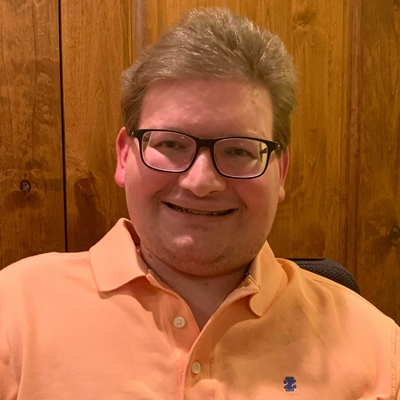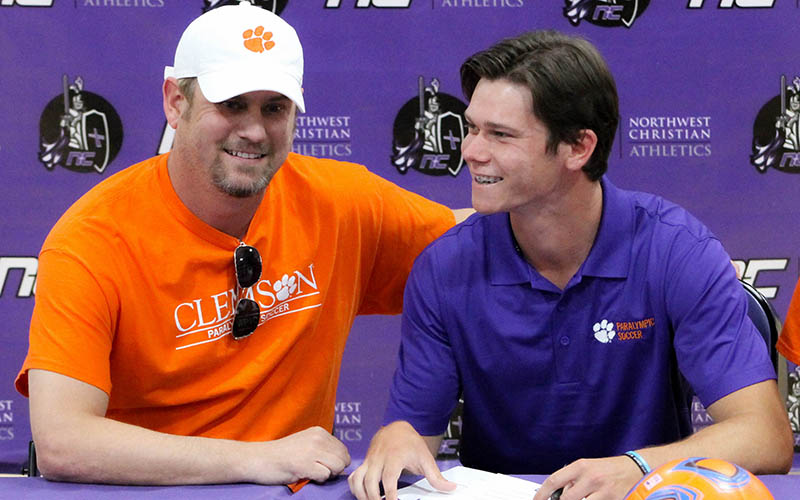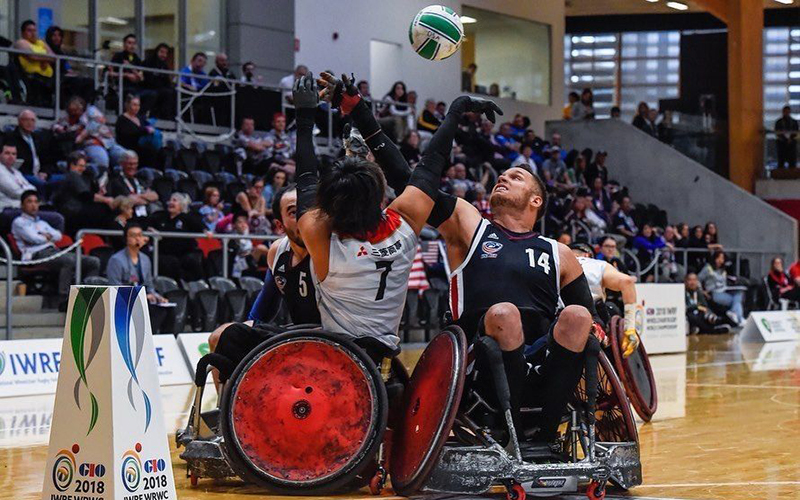
After a boating accident left him paralyzed from the chest down, Joe Delagrave was determined to find something else that fueled his competitive juices. Wheelchair rugby was the answer. (Photo courtesy of Delagrave family)
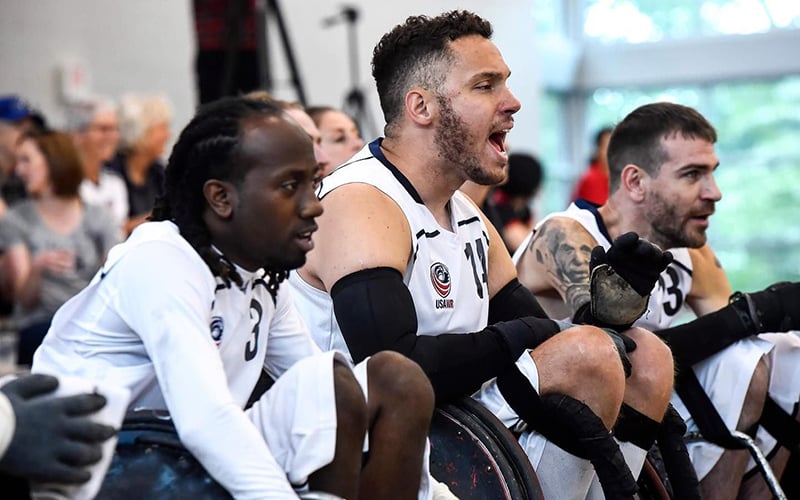
Delagrave has qualified for two Paralympics (he was an alternate in Rio de Janeiro) and has his sights set on Japan this summer. (Photo of courtesy Delagrave family)
PHOENIX – It was July 10, 2004.
Joe Delagrave was on the Mississippi River, enjoying a boating trip with friends. When the driver made a sudden turn, the boat struck ground and Delagrave flew from his seat and collided with the front interior of the boat.
His life changed forever.
An accident. Paralysis. Surgery. Wheelchair. Yet here he is, in his 13th year on the U.S. National Wheelchair Rugby team and his eighth as a co-captain, viewing life as an opportunity to be the victor and not the victim. He hopes to qualify for his third Paralympics rescheduled for this summer in Tokyo and will learn his fate May 22, when the team is expected to be announced.
Delagrave, 19 at the time and a 6-foot-5, 285-pound tight end, was preparing for his sophomore football season at Minnesota’s Winona State University when the accident occurred. He was immediately airlifted to a local hospital and rushed to an operating room, where a five-hour surgery took place.
“They fused my neck at the C6 and C7 (vertebrae) level,” Delagrave said.
After the surgery, he was placed in intensive care and eventually began therapy. He was paralyzed from the chest down.
Therapy was not fun for Delagrave as he had to learn a new way of life as a wheelchair user in addition to relearning everyday tasks such as eating and getting dressed.
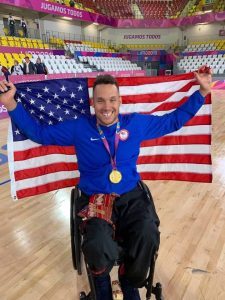
Delagrave said when he found he had made the U.S. team that would compete in the Summer Games in London in 2012, he started “crying, it was an emotional experience.” (Photo courtesy of Delagrave family)
“It’s tough. You also want to encourage him to be as independent as possible,” his wife, April, said. “It’s kind of a fine line of pushing him to relearn it, but also wanting to help and be supportive at the same time.”
Delagrave found that family and friends motivated him.
“I had a lot of support around me and a lot of people to build me up,” Delagrave said.
When he returned to Winona State, he struggled with his identity. What was his role? Where would he fit in?
“He was back to helping out with the football team, and going to the practices,” April said about a new reality that was in full swing. “I think it was difficult for him because he had to relive what he was missing out on.”
While working with the football team, Delagrave realized his competitive fire still burned. From there he was in search of an adaptive sport that would quench his thirst.
He scoured the internet and his curiosity led to him watching a video of wheelchair rugby. He also cites “Murderball” as another way athletes at the time found the sport.
The 2005 documentary followed various members of the U.S. quad rugby team on their way to the 2004 Paralympic Games in Athens, Greece. Scott Hogsett, Delagrave’s mentor and a three-time Paralympic medalist, was featured in the film.
Hogsett believes Murderball changed widespread perceptions.
“It answered a lot of misconceptions that people have about people in wheelchairs,” Hogsett said. “It’s more about what we can do instead of what we can’t do.”
After watching the documentary, Delagrave found a local team, and without hesitation he and April went to see what wheelchair rugby was like. He soon hopped in a chair and joined a workout.
It wasn’t an easy transition.
“I was terrible at that practice, but I had so much fun,” Delagrave said.
The experience sealed the deal, as Delagrave chose to pursue a career as a professional wheelchair rugby player in 2006.
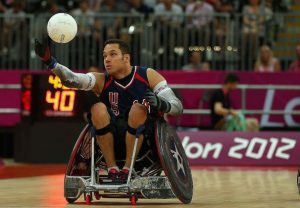
Delagrave, a former college football player, said once he started playing he realized he needed to get in shape and lose weight for wheelchair rugby. (Photo courtesy of Delagrave family)
Initially the sport provided him with an opportunity to improve his health as he “needed to lose a lot of weight,” he said.
He didn’t think about pushing himself to become a Paralympian until watching the 2008 Beijing Paralympics. The U.S. won gold and “that’s where I kind of fell in love with the idea,” he said.
After that, Delagrave took a leap of faith, opting to move to Arizona to improve on all aspects of becoming a Paralympian, specifically rugby.
Hogsett recalled learning about Delagrave through the grapevine.
“I had heard a lot about Joe, I didn’t know much about him,” Hogsett said. “I knew that he lived in Minnesota, that he was an up-and-coming player. I heard that he was a big, tall dude with really long arms.”
Training with Hogsett proved to be beneficial as Delagrave was able to expedite the learning curve, in addition to developing the habits of a Paralympian.
“He had the drive to get better,” Hogsett said.
Delagrave’s focus shifted, with a goal to make the next Paralympic team.
He joined other prospective players, huddled in the Sington room at the Lakeshore Foundation, in Birmingham, Alabama, awaiting the announcement of who would make the team for the London Paralympics in 2012.
As the names were announced, anticipation began to build. Delagrave heard his name called. It was official.
“I remember crying, it was an emotional experience,” Delagrave said.
Team USA took the bronze medal in 2012, beating Japan 53-43. After that, Delagrave set his sights on the 2016 Paralympic Games in Rio de Janeiro, Brazil.
The road to Rio de Janeiro was straightforward for him, and he chose to go with the routine that led to London instead of shaking things up. However, when the announcement for who made the team came, Delagrave was named an alternate.
“Going through that was one of the most pivotal things I have been through in my life,” Delagrave said.
The decision led him to look inward, assessing what was in his control and how he could improve to be better for the future.
In Rio de Janeiro, Team USA won the silver medal after losing to Australia 59-58 in double overtime in the gold medal match.
Flash forward to 2021: Delagrave is focused on making it to Japan for the Summer Games and proving Rio was an oddity.
And he knows if he makes it, competition will be stiff. He has watched the sport evolve.
“Not only has it grown in (the) number of countries that play, but it’s grown in the number of countries that compete for a medal,” Delagrave said.
Whatever happens, he is grateful for Hogsett’s mentorship.
“That’s what put me over the edge,” Delagrave said. “He really taught me the game and taught me how to be an athlete.”
Delagrave hasn’t put much thought into what lies ahead after Tokyo, but making it there will provide him with the opportunity to create a full circle moment. He can get retribution for the Rio de Janeiro Games, and possibly make it to the top of the mountain this summer.
